The DCH is a horizontally integrated data platform that collects, consolidates, processes and securely shares building data. By making smart building data more accessible, the DCH will drive innovation amongst a broad ecosystem of participating services providers, leading to better products, increased competition, lower prices and an increased value proposition for participants. The DCH is currently under development and set for limited release in 2020.
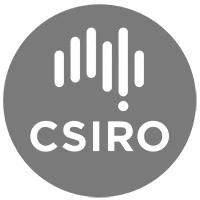
Location: Australia
Industry: Building & Data
Project Funding: 30m
Project Website: http://dataclearinghouse.org
Buildings Evolved are proud to be the leading predesign consultant for the i-Hub Smart Buildings Data Clearing House (DCH) – A software platform designed to solve common data related problems for owners and operators of existing or new commercial, industrial, government, and mixed-use developments.

Deep Energy is built as a DCH application. This allows interoperability with other applications & services to build on existing datasets.
Business Drivers
Owners and operators in the built environment face significant challenges and limitations for equitable access to information. Such as:
- Struggling to consolidate data from multiple disconnected systems and service providers;
- Data vendor lock-in, vertically integrated solutions, inflexible proprietary hardware and software solutions with high fees;
- Acquiring a property often means technology uplift and retrofit to suit organisational need; and
- Limited access to skilled staff and systems to drive actionable processes in a timely manner.
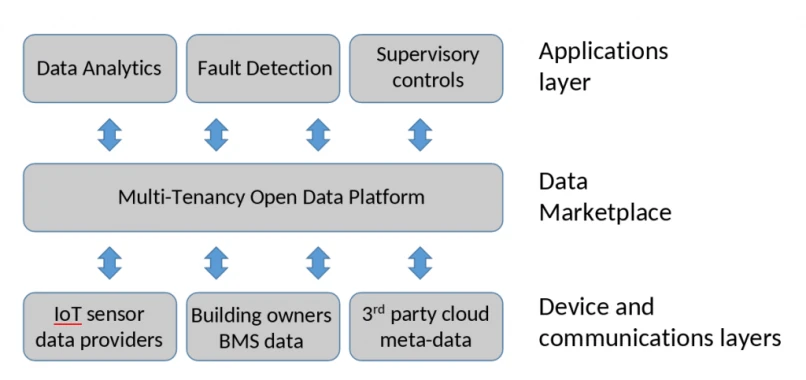
Benefits
The Data Clearing House project seeks to achieve equitable access to information across operational management by:
- Integrating and automating data processes within a consolidated data platform using a quality data framework
- Simplify operations and realise direct cost savings by reducing the many and varied vendor solutions and gain more data flexibility for analysis
- Access to a range of ‘intelligent’ cloud-based diagnostic services to improve the operation of buildings
- Design bespoke applications across any source, system or provider from a consolidated data platform
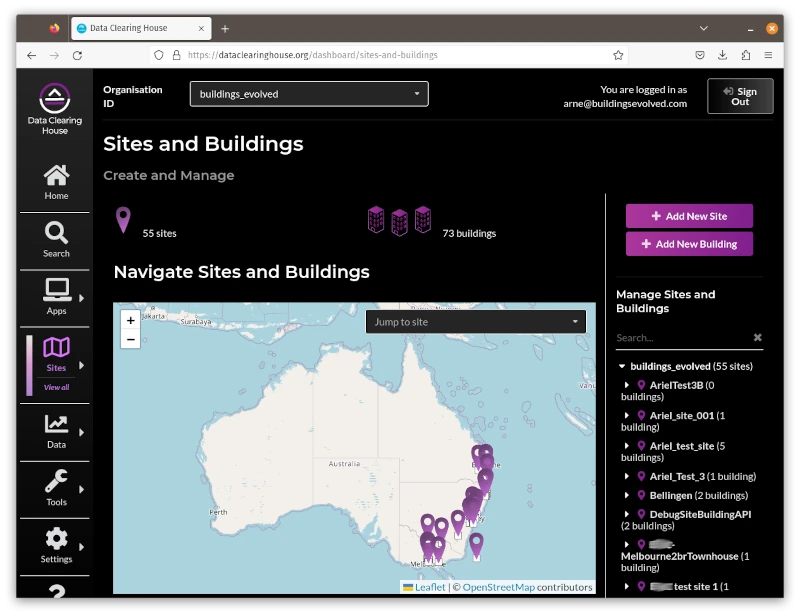
Design
The DCH design is based on a high-availability software framework intended to continually ingest data from a wide array of heterogeneous sources, both in format and protocol. API interfaces and bespoke applications of time-series data are transformed in near real-time so decision makers can optimise strategic, financial, operational and workflow planning.
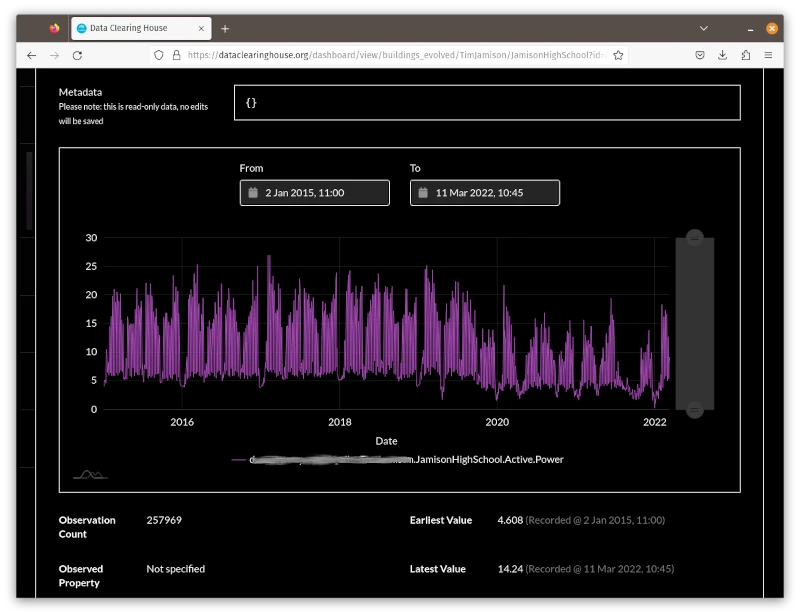
Smart buildings will provide real-time edge data in the MQTT protocol from sources such as plant and equipment to enable improved efficiency, maintenance and building functionality. Integrating this data with utility bills, service providers and external data sources will complete the data picture, radically improve building operations and control.
Data sources and their processing/ingestion method will be modular by design, so that individual plugins can be added, upgraded or removed without any detrimental impact upon other data sources.
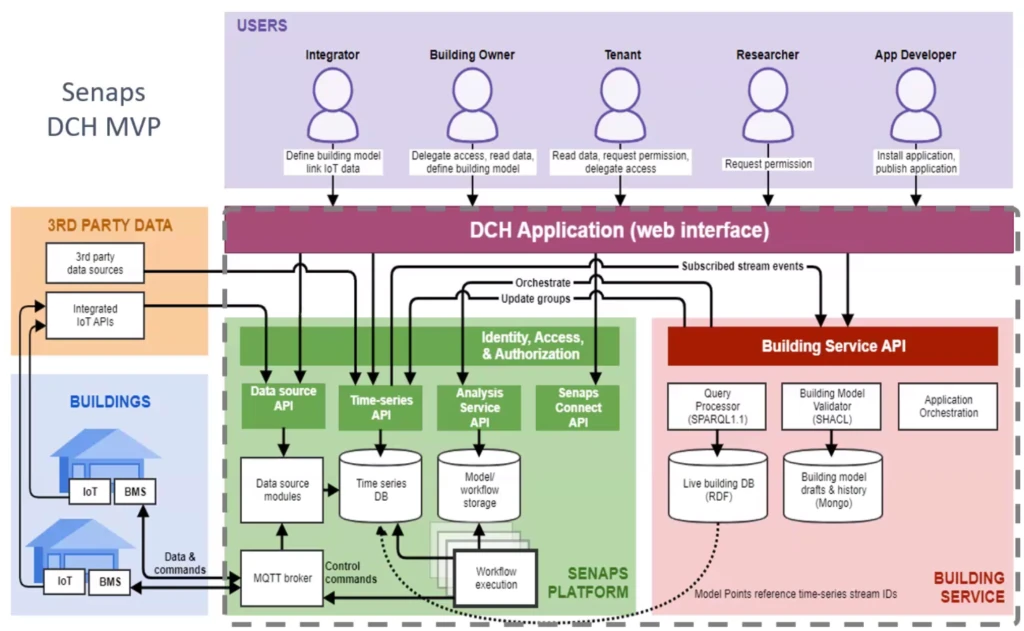
Outcomes
The DCH is set to deliver key functionality from day one:
- Real-time visualisations, dashboards, alerts & alarms – drive operational management, analysis and control with access to pre-built software-as-a-service modules;
- Third-party Systems – produce events to be actioned upon by connecting to popular vendor systems; Salesforce, Zendesk, Atlassian, amongst others;
- Asset Register – streamline asset management through building information modelling scenarios to deliver time and budget efficiencies; and
- Work-flow systems – Realise efficiencies in equipment by automating the tuning of smart-buildings with machine learning processes
Building Shared Values
Be part of the solution, our global contribution:
- Participate in an international initiative to share and collaborate smart building data for benchmarking, modelling and continual commissioning of built assets;
- Provide research institutes and academics anonymise building data to improve the operation of buildings through innovation programs, research and development of the DCH;
- Be part of Australia’s commitments to the Paris (COP21) agreement on climate change and help reduce emissions
Optimising Technology
Develop organisational goals – translate problems into opportunities through technology to deliver value and return-on-investment:
- Real-time data applications
- Up-to-the-minute polling from edge devices
- Support for event-driven data processing
- Incorporate external data sources
- Integrate with standardised reporting tools
- Enables modular infrastructure changes
Focus on data security, access, ownership and anonymity
- Security – Organisational data is secured within your consolidated data platform using industry standard encryption, format and protocol best practices.
- Access – Data access can be determined specific to user role ensuring that personnel have access to the right data to do their job.
- Ownership – Retain complete ownership and control of organisational data within the DCH platform

